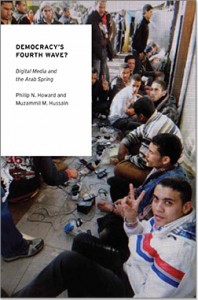Democracy's Fourth Wave: Digital Media and the Arab Spring. A Conversation with Phil Howard and Muzammil Hussain

NDI is pleased to welcome Philip Howard and Muzammil Hussain for a conversation on the role of digital media in the recent MENA revolutions. Here is their talk today at NDI.
Howard and Hussain ask: Did digital media really "cause" the Arab Spring? Is digital media becoming fast "Democracy's Fourth Wave"? In their research, Howard and Hussain found that an unlikely network of citizens used digital media to start a cascade of social protest that ultimately toppled four of the world's most entrenched dictators. Drawing from an extensive data set, the two found that the complex causal recipe includes economic, political and cultural factors, but that digital media is consistently one of the most important sufficient and necessary conditions for explaining both the fragility of regimes and the success of social movements. The new book by Howard and Hussein looks at not only the unexpected evolution of events during the Arab Spring, but the deeper history of creative digital activism throughout the region.
About the speakers:
Philip N. Howard is an associate professor in the Department of Communication at the University of Washington. He directs the World Information Access Project and the Project on Information Technology and Political Islam. He is the author of The Digital Origins of Dictatorship and Democracy. He teaches courses on research methods, politics online, and international development.
Muzammil M. Hussain is a doctoral candidate at the University of Washington’s Department of Communication, and comparative international researcher at the Center for Communication and Civic Engagement (CCCE) focusing on information infrastructure and social organization, and digital media and political participation.
